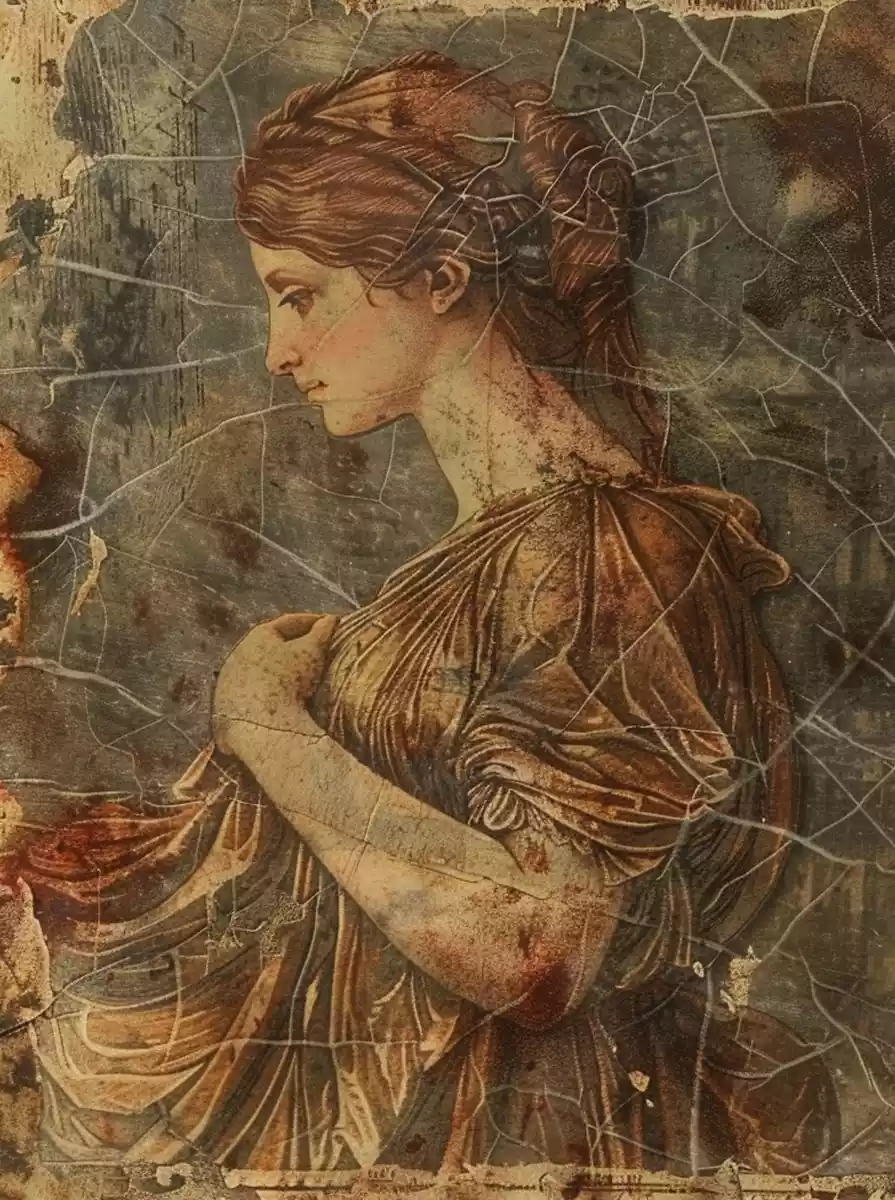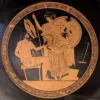
Cassandra, daughter of King Priam and Queen Hecuba of Troy, remains one of the most tragic figures in Greek mythology. Born around 1200 BC, her life was marked by the gift of prophecy, bestowed upon her by the god Apollo. Yet, doomed to never be believed, Cassandra lived a life of despair and anguish, culminating in her death during the fall of Troy. Her story resonates deeply with the tragic destiny of Troy itself, forever entwined in the tapestry of ancient lore.
As one of the most enigmatic and compelling characters in Greek mythology, Cassandra’s life and prophecies have captivated poets, writers, and artists for millennia. From Homer and Aeschylus to contemporary creators, Cassandra’s legacy endures, continually inspiring new interpretations and perspectives. This article delves into the life, prophecies, and enduring impact of this unforgettable figure, illuminating her timeless significance in global literature and art.
The Life and Prophecies of Cassandra
Early Life and the Gift of Prophecy
Cassandra was born as a twin with her brother Helenus, both endowed with the gift of prophecy. Legend has it that as children, they were left overnight in the temple of Apollo. In the morning, serpents were found licking their ears, granting them the ability to hear the voices of the gods and foresee the future (Pillinger, 2019). However, while Helenus’s prophecies were always heeded, Cassandra was cursed to have her pronouncements consistently disbelieved, a cruel twist of fate that shaped her tragic existence.
As Cassandra matured, her beauty and wisdom became renowned throughout Troy. Apollo himself, captivated by her allure, fell in love with her and offered her the gift of prophecy in exchange for her affection. Cassandra accepted the gift, but later rejected the god’s advances. Enraged, Apollo cursed her: though she would retain the power of prophecy, no one would ever believe her predictions, a divine punishment that became her lifelong burden.
The Prophecies and the Fall of Troy
Throughout the Trojan War, Cassandra foresaw many of the devastating consequences of the Trojans’ decisions. When Paris brought Helen to Troy, she prophesied that this act would lead to the city’s ruin, a dire warning tragically ignored. She also cautioned against the Trojan Horse, imploring the Trojans not to bring it within their walls. However, bound by Apollo’s curse, her warnings fell on deaf ears, her pleas dismissed as the ravings of a madwoman.
Cassandra’s most tragic moment arrived on the night of Troy’s fall. As the Greeks stormed the city, she sought refuge in the temple of Athena. Yet, Ajax the Lesser violated her before the statue of the goddess, a heinous act of sacrilege that compounded her suffering. Subsequently, Cassandra was taken as a spoil of war by Agamemnon, the leader of the Greeks, and carried back to Mycenae as his slave and concubine, her fate sealed in the aftermath of the war.
The complex relationship between Cassandra and the power of prophecy in Greek and Latin literature has been explored by numerous scholars. Elke examines her portrayal in Marion Zimmer Bradley’s novel “Firebrand,” where the heroine is depicted as a powerful figure who seizes control of her narrative, offering a contemporary interpretation that challenges traditional patriarchal readings of the myth and provides an alternative perspective on Cassandra’s experiences and voice.
The Unheard Prophetess: Cassandra’s Tragic Odyssey
Life in Mycenae and Death
Arriving in Mycenae, Cassandra faced a bleak reality. As Agamemnon’s slave and concubine, she was forced to live under the shadow of his wife, Clytemnestra. Despite her dire circumstances, Cassandra remained proud and dignified, refusing to succumb to despair. With her gift of prophecy still active, she foresaw her own demise, as well as the downfall of the House of Atreus, a lineage cursed by ancient transgressions and destined for further tragedy.
Tragedy struck Cassandra and Agamemnon upon their return to Mycenae. Clytemnestra, consumed by rage over the sacrifice of their daughter Iphigenia and her husband’s infidelity, conspired with her lover, Aegisthus, to murder Agamemnon. Ensnared in a web of treachery and vengeance, Cassandra too fell victim, slain by Clytemnestra alongside Agamemnon, their blood staining the palace floors in a final act of retribution.
Her death marked the tragic end of a life filled with suffering and rejection. Despite her gift, she was powerless to alter her fate or save those she loved. Her story mirrors the relentless nature of destiny in Greek mythology and the inability of mortals to escape their predetermined paths, even when endowed with divine gifts. Cassandra’s life serves as a poignant reminder of the limitations of human agency in the face of overarching fate.
The Psychological Dimension of Cassandra’s Gift
Beyond her tragic fate, Cassandra’s story raises questions about the psychological impact of the gift of prophecy. Condemned to witness the future yet unable to convince anyone, she experienced a profound sense of alienation and isolation. Her prophecies, though accurate, were dismissed as the ravings of a madwoman, her insights disregarded due to the curse Apollo bestowed upon her.
This psychological dimension of Cassandra’s story has captivated numerous scholars and artists. Her ability to perceive the truth, yet being unable to convey it, can be interpreted as a metaphor for the human condition and the limitations of knowledge and communication. She becomes a symbol of the agony of isolation and misunderstanding, a reminder of the power and fragility of truth, forever trapped within the confines of individual perception.
Cassandra’s tragedy, therefore, lies not only in her violent end but also in the psychological ordeal she endured. Her gift became her curse, as it condemned her to a life of rejection and scorn. Her story serves as a powerful commentary on the complexity of human existence and the consequences of possessing a truth that the world is not ready to accept, highlighting the chasm between insight and acceptance.
Her Legacy
Cassandra in Art and Literature
Cassandra’s tragic story has left an indelible mark on art and literature, inspiring countless artists and writers to interpret and reimagine her narrative. From ancient Greek tragedy to contemporary poetry and prose, Cassandra’s figure has been used as a symbol of despair, truth, and the human condition, embodying the eternal struggle between knowledge and disbelief.
In ancient Greek literature, Cassandra appears in the epic poems of Homer and the tragedies of Aeschylus and Euripides. In these works, her character functions as a vehicle for tragic irony, as her prophecies, though true, fall on the deaf ears of her fellow Trojans. Her narrative becomes an example of the inability of humans to confront the truth and avert their fate, despite being presented with clear warnings and divine insights.
In the modern era, Cassandra continues to inspire artists and writers across various mediums. In literature, she has been featured in novels such as “Cassandra” by Christa Wolf and “The Firebrand” by Marion Zimmer Bradley. These works reinterpret her story, giving voice to Cassandra’s perspective and exploring the psychological and emotional dimensions of her experience, granting her agency in the retelling of her own narrative.
Vinagre (2015) examines the relationship between knowledge and pain in Cassandra’s story, arguing that her gift becomes a source of profound psychological anguish. This interpretation sheds light on Cassandra’s internal struggle and the sense of alienation she experiences as a result of her curse, trapped between the burden of foresight and the frustration of disbelief.
The Enduring Significance of Cassandra
Cassandra’s legacy transcends the boundaries of literature and art, as her story continues to resonate in the contemporary world. Her figure has become synonymous with rejection, scorn, and the inability to be believed, even when speaking the truth. In a world where truth is often challenged or ignored, her story remains relevant and enlightening, serving as a cautionary tale and a source of inspiration.
Moreover, Cassandra has evolved into a symbol of the female voice and resistance against patriarchal oppression. Her refusal to submit to Apollo and her persistence in speaking the truth, even in the face of rejection and punishment, make her an emblematic figure of female empowerment. Her story reminds us of the importance of staying true to oneself and standing up for the truth, even when it comes at a cost, emphasizing the enduring power of integrity.
In conclusion, Cassandra remains one of the most fascinating and iconic figures in Greek mythology. Her tragic story, filled with pain, rejection, and self-sacrifice, continues to move and inspire us today. Through art, literature, and cultural consciousness, Cassandra’s legacy lives on, illuminating the deepest truths of human existence and urging us to face the world with courage, integrity, and belief in ourselves, despite the odds.
Epilogue
Exploring the life, prophecies, and legacy of Cassandra reveals the complexity and timelessness of this enigmatic figure of Greek mythology. The gift and curse of prophecy shaped her tragic path, making her a symbol of truth, rejection, and the human condition. Through art and literature, her story continues to resonate with us, offering diverse interpretations and perspectives. The psychological dimension of her gift, her resistance to patriarchal oppression, and her insistence on truth make her an emblematic figure who continues to inspire and illuminate the human experience, reminding us of the importance of integrity and self-belief in the face of adversity.
elpedia.gr
- Pillinger, E. J. (2019). Cassandra and the Poetics of Prophecy in Greek and Latin Literature. Cambridge University Press. books.google
- Elke, S. (2017). Cassandra prophesies back: Marion Zimmer Bradley’s Firebrand. In Prophets and Profits. Routledge. taylorfrancis
- Vinagre, S. P. (2015). Cassandra, between knowledge and suffering. In Figures tragiques du savoir. repositorio

